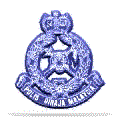|

The
GR Series of Automatic Rifles and Machine Guns
Cal.
5.56mm x 45 NATO

The
GR Series of
HK rifle and Machine Gun variants are quite rare. So rare in
fact, that I don't believe that they are in production in any
significant quantity. They are variants of other existing
guns like the HK23E, as well as variants of the HK33 and 53
series. These guns are all chambered in 5.56 NATO caliber.
According to the only reference available on these guns, a short
description in the comprehensive 50th anniversary HK book by
Kersten and Schmid, GR stands for "German Rifle."
The C and S suffixes stand for "Colored" and
"Sand" respectively. This denotes either the
woodland or desert camouflage paint schemes. They are most
distinguishable as having a permanent optical sight, and no open
sight capability. These examples are also done exclusively
in HK's woodland or desert camouflage paints. The guns are
beautiful.
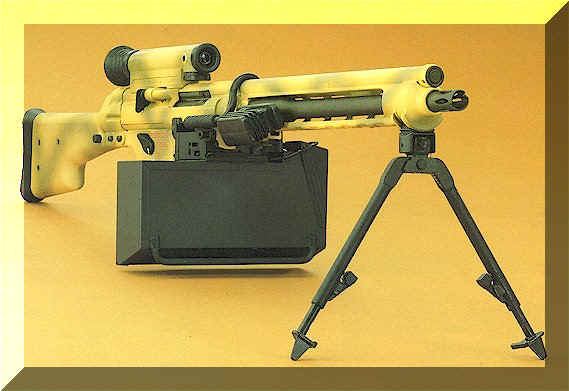
The GR9S Belt Fed Machine Gun-- 5.56 x 45 NATO
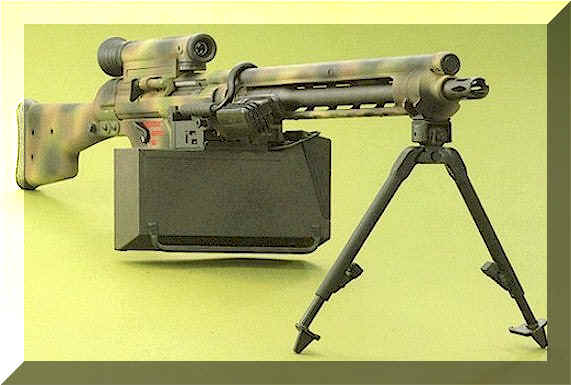
The GR9C -- 5.56 x 45 NATO
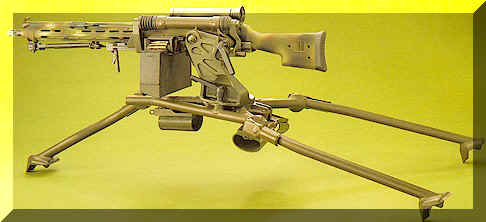
The GR9C on shock absorbing tripod
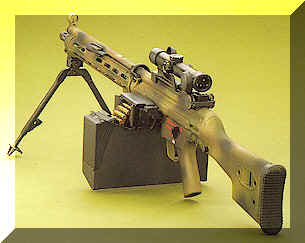
HK23E in woodland camo with removable 4X scope
|
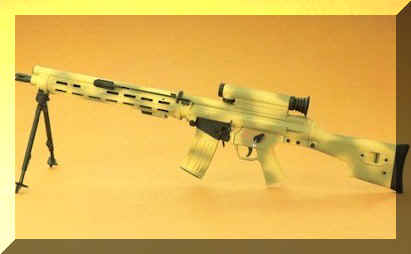
|
|
This
is the GR6S. It is essentially an HK13E (HK23E
with box mag adaptor installed.)
|
|
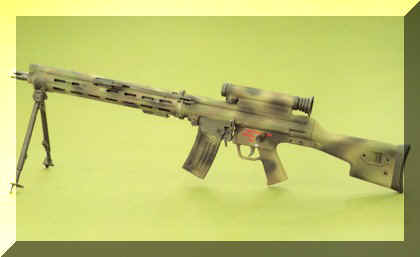
|
|
This
is the GR6C. Same as above, only in woodland
camouflage.
|
|
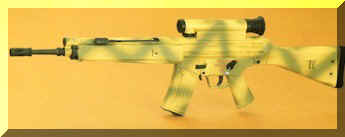
|
|
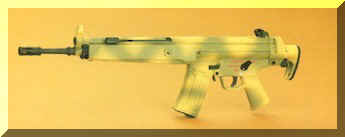
|
|
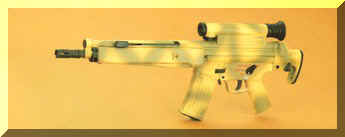
|
|
From
top to bottom: The GR3E A2S automatic rifle,
essentially an HK33E with optical sight and desert camo.
A2 refers to the fixed stock. Middle:
HK33ESA3. Conventional HK33E with retractable
stock and desert camo. Bottom: GR3KS,
essentially an HK33K with integral sight and desert
paint.
|

The GR2C is an HK53 variant in Woodland Camouflage with a
permanently mounted optical sight and no provision for open
sights. These rare guns are perhaps prototypes and not
actually in production. I have never seen these offered for
sale in the United States.
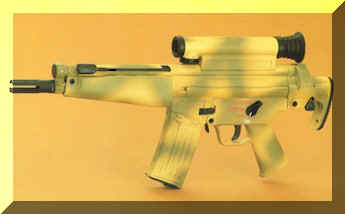
GR2S in Desert Camouflage. This paint scheme is sometimes
informally referred to as "baby poop camo." Any
idea why?

The
HK PSG1
The Top of the Line
Cal. 7.62
x 51 NATO
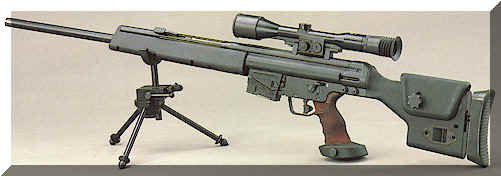
| The
PSG1 (Präzisionsschützengewehr 1) Precision Shooting
Rifle. This appears to be the standard by which other
semi automatic sniper rifles are measured. Ringing up at
roughly $10,000 U.S. when they were still importable,
the PSG-1 is a rifle system that if in your HK
collection would rank you with the best.
Sporting
a 25.6 inch cold hammer forged polygonal rifled barrel,
the PSG1 has a strengthened receiver to minimize torque,
the famous (and heavy) PSG1 fully adjustable buttstock,
and a clip on trigger group with wooden handle
adjustable for hand size. The gun comes as a package in
an aluminum case as pictured below. The Garbini tripod
is the final accessory, though many also came with a
bipod.
For
optics, the PSG1 uses a permanently mounted Hensoldt 6 x
42 with lighted ranging reticle for distances to 600 m.
This gun is not for the slight of build. The rifle
weighs nearly 20 lbs. It is sometimes incorrectly
mentioned that the PSG1 was featured in the movie
Sniper, being carried by Billy Zane. It is not. |
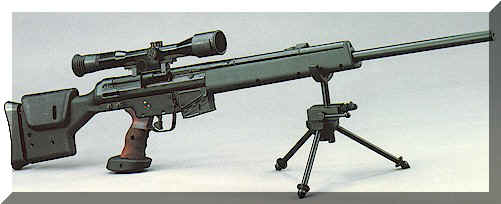 |
| Visible
from right side is the forward assist or silent bolt
closure device, standard on most HK precision
rifles. Also present is the Garbini tripod,
cumbersome I would think. A standard bipod would
be more useful. |
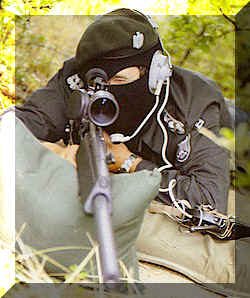 |
GSG9
Sniper with PSG1 and rather antiquated communications
headset by today's standards. This photo is close
to 13 years old. It comes from the book GSG9,
German Response to Terrorism. It is out
of print. |
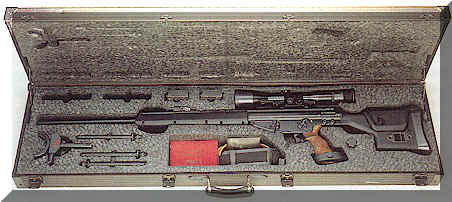
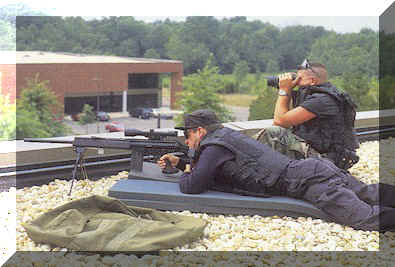 |
| Former
HK employee and son of former HK president Jim Woods,
Jeff Woods mans the PSG1 while former employee Chris
Staub acts as observer. This photo was taken
on the roof of the Sterling, VA facility for a catalog
photo. Staub is now a young deputy with the
Loudoun County Sheriffs Department, the county where
Sterling, Virginia is located. Barely
visible straight above the front of the trigger guard is
white lettering. This says, "HK T&E
Only." HK has an extensive demo and T&E
program for police agencies wishing to try their
firearms before purchasing them. |
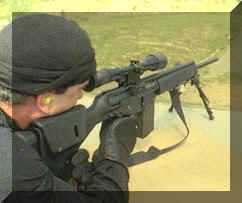

The
Mark 23 Mod 0
The "SOCOM"
Cal. .45
ACP
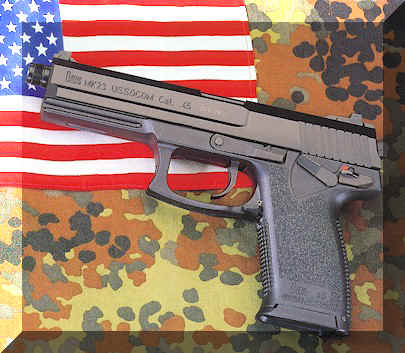
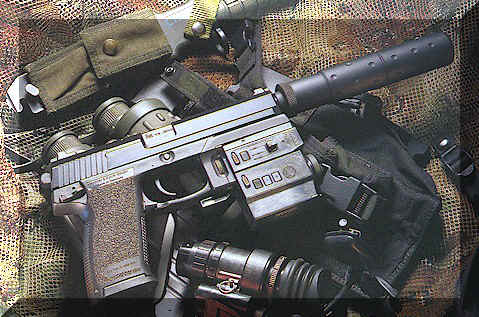
| In
August, 1991 a request was made for the U.S. Special
Operations Command (USSOCOM) for an
"offensive" handgun. Dianne
Feinstein, Charles Schumer and President Clinton would
probably tell you that all handguns are offensive, but
SOCOM had something different in mind.
Termed the OHWS, for Offensive Handgun Weapon System, it
was a pistol designed within certain specified
parameters that would be sufficient for conducting
"offensive" operations, as opposed to the more
tradtional role for the handgun, for
"defensive" operations. HK and Colt were
chosen to compete against each other for the new pistol.
HK eventually won out, and the contract was awarded to
them. It has undergone many changes from its birth
in 1991. Some are obvious, some are not. The
official name for the pistol is Mark 23, Mod 0.
Not very catchy. That is why it is more popularly
known as the SOCOM.
The
SOCOM was designed by the great HK engineer, Helmut
Weldle. The gun holds 12 cartridges of .45 ACP
ammunition. In a move that the above folks would
surely find offensive, HK offered a limited number of
SOCOM pistols to the citizenry of the United States, and
left the threaded barrel intact. The suppressor
sold by HK with the gun is made by Knight's Armament
Company of Vero Beach, FL. It is usable wet
or dry, with wet knocking even more dB from the already
quiet can.
Insight
Technology Inc., the maker of the UTL series for the USP
pistols, was chosen to provide the Laser Aiming Module.
It had a dual laser, one visible light, and one
infrared, visible only with night vision. Wilcox
Industries Corp. has the LAM featured in the Ichiro
Nagata photos that start this page. I have
not heard that this is the new unit that SOCOM adopted
over the one made by Insight, but it appears to be the
case. If anyone has the definitive answer or
dates, please advise. hkpro@hkpro.com
The
SOCOM pistol has reportedly met with tepid enthusiasm on
the part of the operators it was ultimately issued to,
due to its huge size. It feels like a Desert
Eagle, and rivals it in size. The introduction of
the USP Tactical seems to have answered the size
questions, and may prove to be more popular in the long
run. One of the uncompromising attributes of
the SOCOM pistol, however, is the extreme accuracy.
It is an absolute tack driver, with groups possible
under two inches at 50 yards.
No
matter what you think about a handgun replacing a
shoulder fired weapon as an offensive arm, the staff at
HK produce what they are asked to produce.
This was a request from the U.S. government. They
were provided with a list of what they wanted, and as
usual, HK delivered.
|
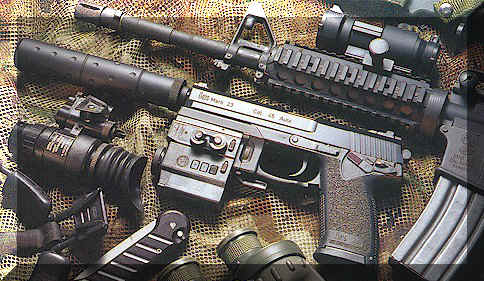
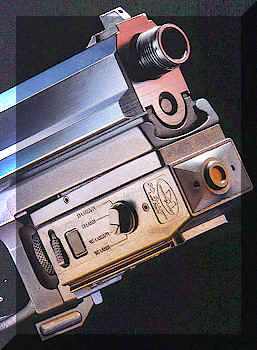
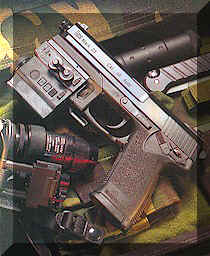 |
| No
one takes firearm photos better than the great Ichiro
Nagata of Guns and American Handgunner magazines.
These first images represent some of his work. He
is an accomplished competitive shooter in his own right. |
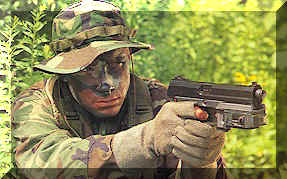
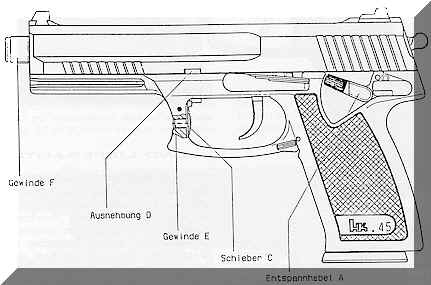 |
| Early
production diagram of the SOCOM pistol.
Incorporated into this early prototype is the "Schieber,"
defined literally from the German as a "sliding
safety." This is in actuality the slide
lock that was dropped from the latest production models.
The slide lock functioned to keep the slide from opening
upon firing, which allowed the firer to retrieve the
spent casing for added stealth, and added to the
quietness of the fired shot by eliminating slide
movement. |
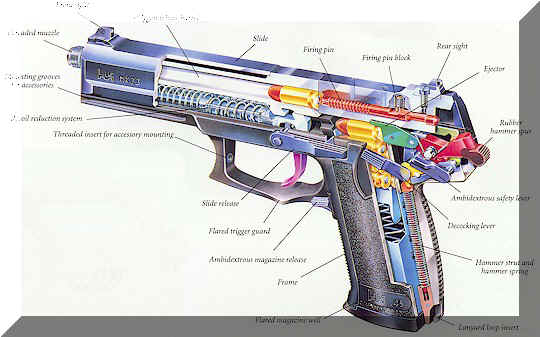
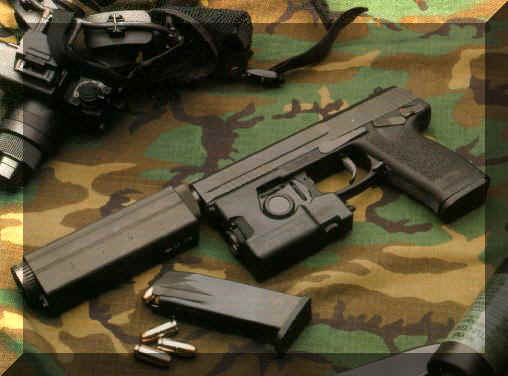 |
| Early
prototype with early rectangular suppressor and LAM
unit. (LASER Aiming Module). This
suppressor and LAM were dropped for the current units as
described above. |
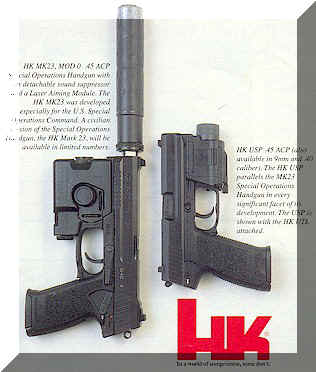 |
| Ad
bragging on the SOCOM for civilian USP sales that
clearly shows the common lineage of the two
handguns. This ad, though not clearly
readable, announces that limited numbers of a civilian
version of the SOCOM will be available.
|
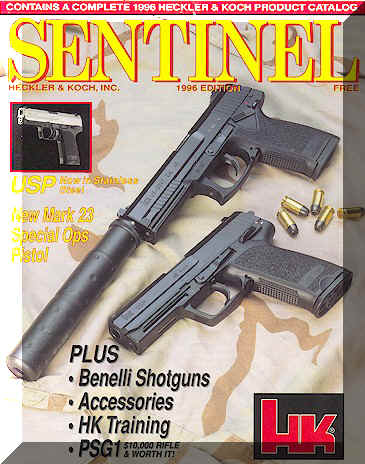 |
| Cover
of now defunct HK Sentinel magazine/catalog from 1996
with catchy photo of the SOCOM pistol with the USP45,
its little brother. Photo also shows some of the +P
Black Talon rounds from Olin/Winchester made for use
with the SOCOM. |

|
|
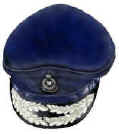 |
 |
|
![]()
![]()
![]()
